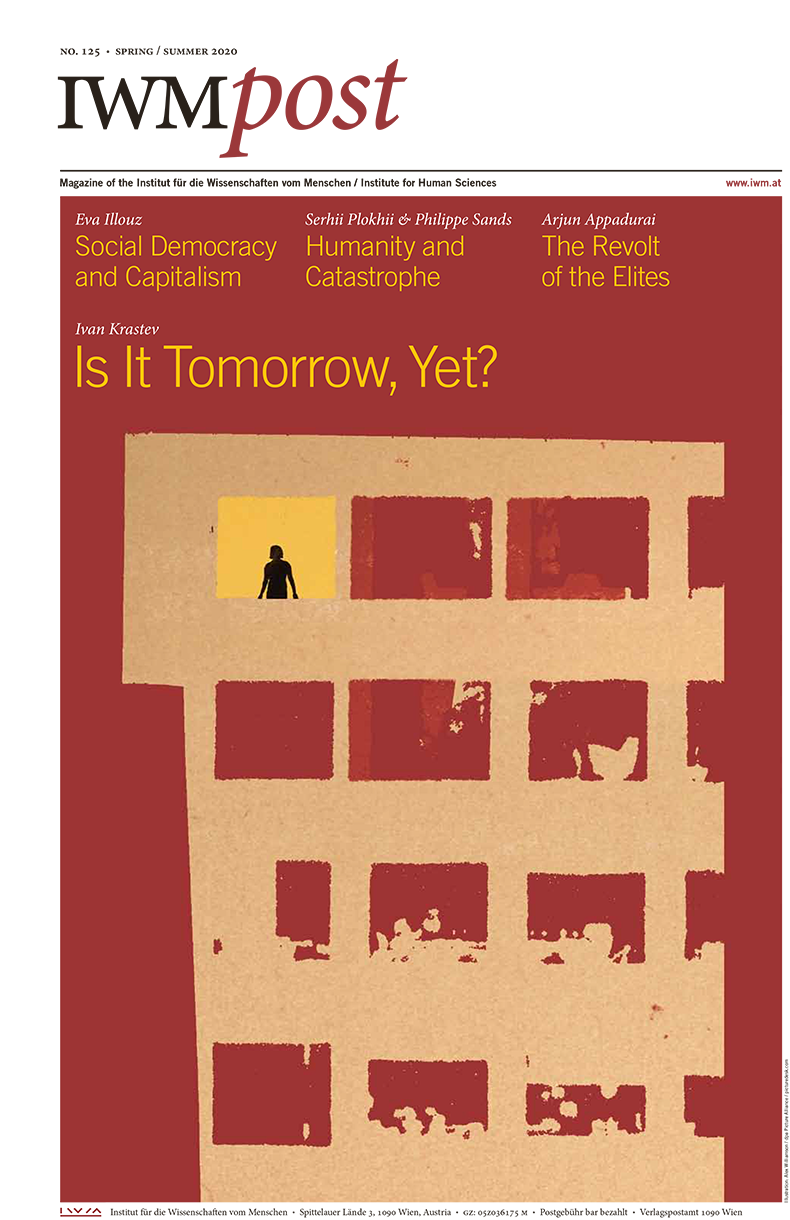Is it tomorrow yet? This is the question Ivan Krastev asks at the beginning of his new book, which deals with the question of how the current pandemic will change Europe.
Alongside Jiří Přibáň and Steven Lukes, who write about the lessons of the crisis and the impact of the “new normality” on social solidarity, Alida Vračić and Ranabir Samaddar take a closer look at the impact on the health and care system. Political developments such as the “revolt of the elites”, which Arjun Appadurai describes in his contribution, will be given a new dynamic by the pandemic, as will the myth of the EU’s collapse, as Hugo Brady takes stock at the end of Donald Tusk’s term in office. While Eva Illouz reflects on the challenges facing social democracy, Grigorij Mesežnikov analyses the political earthquake in Slovakia following the murder of journalist Ján Kuciak. Two new books from the IWM/Passagen series, which deal with the automation of work (Robert Skidelsky) and the consequences of artificial intelligence and digitality (Timothy Snyder), anticipate much of what has been accelerated by the pandemic and what is also discussed by Walther Zimmerli in this issue. A conversation between Serhii Plokhii and Philippe Sands based on their best-selling books on two other catastrophes of mankind—Chernobyl and World War II—takes us to another focus of this issue, which is devoted to the commemoration of the 75-year anniversary of the end of the war (Vlasta Korda) and new and old forms of antisemitism (Laura Engelstein). John Keane reminds us that an ecological catastrophe may await us in the future, using the example of the devastating bush fires in Australia. In her field research in Mexico, Adèle Blazquez has in turn documented the effects of drug trafficking on the local population. While Clemena Antonova and Jan Sowa conclude by asking what relevance Russian religious philosophy still has today, the contributions of Cornelia Klinger and Shalini Randeria/Ilija Trojanow may help us to find inspiration and encouragement in the lives and work of the historical figures Emma Goldman and Mahatma Gandhi for contemporary crisis management and the fight against growing inequality.
Anita Dick
Marion Gollner
Download the IWMpost 125 as a PDF
Contents
Lessons from the Coronavirus
Is It Tomorrow, Yet? Learning to Live with the Unthinkable / by Ivan Krastev
Lessons from an Unfolding Emergency / by Jiří Přibáň
In the Wake of the Pandemic: The Ethics and Politics of Care / by Ranabir Samaddar
Social Solidarity / by Steven Lukes
Democracy and Inequality
Social Democracy and Capitalism / by Eva Illouz
Gandhi heute / Ilija Trojanow im Gespräch mit Shalini Randeria
A Sunburnt Country: Australia 2020 / by John Keane
Old Axes of Inequality and New Concerns / by Cornelia Klinger
The Revolt of the Elites / by Arjun Appadurai
Beyond Organized Crime. Violence and Drugs in Mexico / by Adèle Blazquez
Europe’s Futures
The Meaning of Tusk and the Myth of Europe’s Collapse / by Hugo Brady
Stopping Medical Brain Drain from the Balkans / by Alida Vračić
Political Earthquake in the Shadow of Coronavirus / by Grigorij Mesežnikov
Religious Philosophy
The Relevance of Russian Religious Philosophy Today / by Clemena Antonova and Jan Sowa
Confronting Memories
Antisemitism Resisted and Denied / by Laura Engelstein
Humanity and Catastrophe / A Conversation between Serhii Plokhii and Philippe Sands
75 Jahre Kriegsende: Umkämpfte Erinnerung / von Vlasta Korda
Artificial Intelligence and Digitalization
Deus Malignus: The Digital Rehabilitation of Deception / by Walther Christoph Zimmerli
Neuerscheinungen in der Publikationsreihe von IWM und Passagen Verlag / von Timothy Snyder und Robert Skidelsky
News from the IWM
Impressum
Editors: Marion Gollner, Anita Dick
Editorial Assistance: Simon Garnett, Katharina Gratz, Sarah Ocsenas, Christina Pössel, Evangelos Karagiannis, Kate Younger.
Design: steinkellner/zotter, www.steinkellner.com
Printed by Print Alliance HAV Produktions GmbH, 2540 Bad Vöslau.
IWMpost is published two times a year.
Current circulation: 6,600

